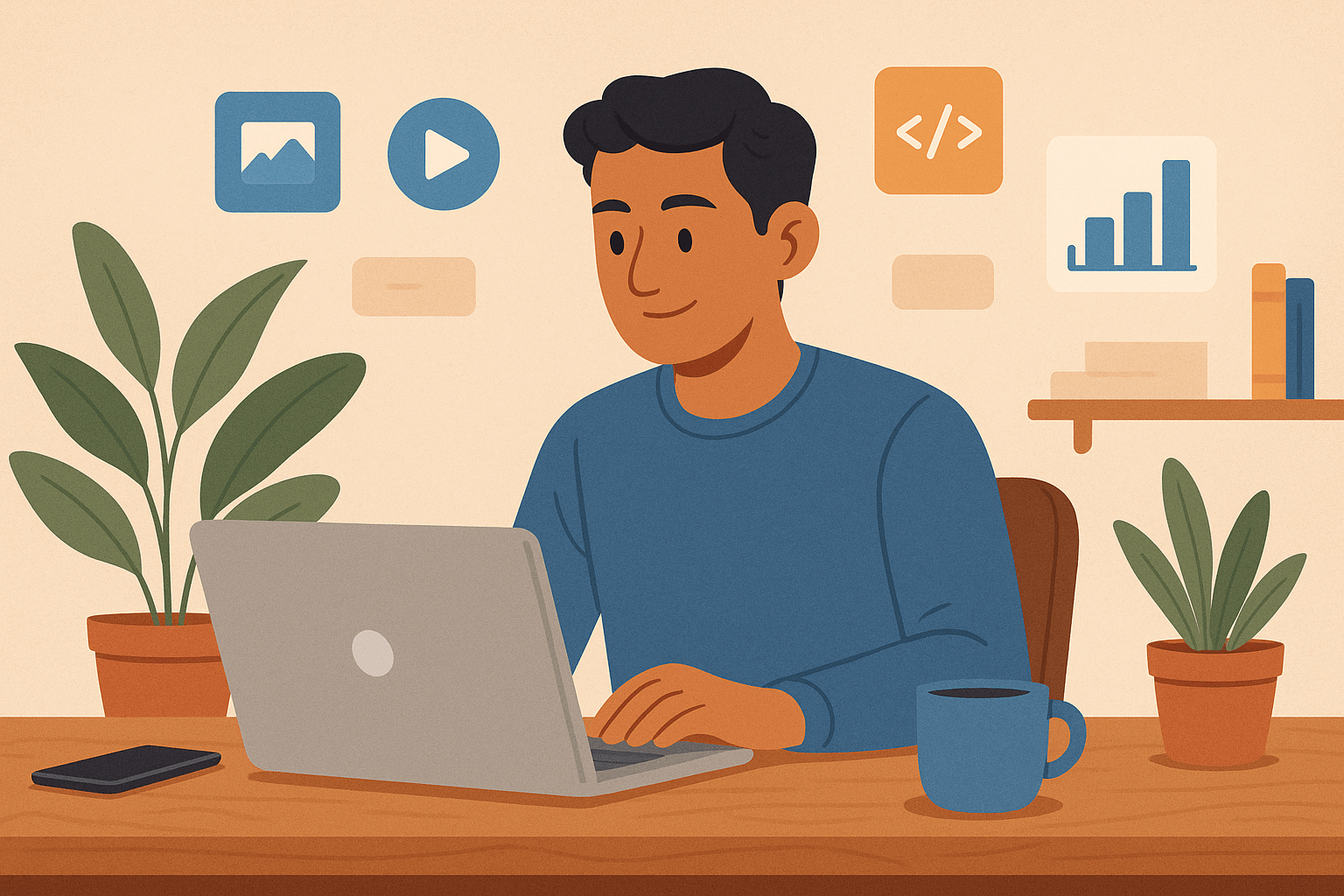How to Start Your Online Career from Scratch
Table of Contents
- Why Consider an Online Career?
- Step 1: Identify Your Strengths and Interests
- Step 2: Choose a Career Path That Fits
- 1. Freelancing
- 2. Remote Employment
- 3. Content Creation
- 4. E-commerce
- 5. Teaching Online
- Step 3: Learn the Essential Skills
- Focus Skills
- Step 4: Create a Digital Presence
- Step 5: Start Small and Build Experience
- Step 6: Set Up a Simple Workspace
- Step 7: Keep Improving and Adapting
- Conclusion: Start Now, Start Small
Starting an online career from zero might sound intimidating—but it’s more achievable than ever in 2025. Whether you’re a recent graduate, someone switching careers, or simply looking to earn remotely, the digital world is full of opportunity. The best part? You don’t need to be a tech genius to begin.
This guide will walk you through every step—from finding your niche to landing your first gig—using real-world tools and up-to-date practices.
Why Consider an Online Career?
The remote work revolution is here to stay. A report from McKinsey shows that up to 25% of workers could work remotely three to five days a week without a loss in productivity (source).
Here are a few reasons why more people are going digital:
- Flexibility – Work from anywhere, on your own schedule.
- Diverse Income Streams – Freelancing, e-commerce, content creation, and more.
- Low Start-Up Cost – Most online careers require only a laptop and internet connection.
- Career Autonomy – You choose the projects, clients, or products you believe in.
Step 1: Identify Your Strengths and Interests
Before jumping into job boards or freelance gigs, get clear on what you’re good at and what you enjoy. Here are questions to ask yourself:
- What skills do I have (writing, design, organizing)?
- What topics am I passionate about?
- Do I enjoy working solo or with others?
- Am I more creative, analytical, or technical?
Use tools like 16Personalities or Skillshare to explore areas that match your personality and potential.
Step 2: Choose a Career Path That Fits
Here are popular online career options:
1. Freelancing
Offer services like writing, graphic design, social media management, or web development on platforms like Upwork or Fiverr.
2. Remote Employment
Apply for full-time remote roles in customer service, data entry, or marketing at sites like We Work Remotely and Remote OK.
3. Content Creation
Start a YouTube channel, blog, or podcast around your niche. Monetize via ads, sponsorships, or affiliate marketing.
4. E-commerce
Open a Shopify store, sell on Etsy, or use print-on-demand to launch your own brand.
5. Teaching Online
If you’re an expert in something, try tutoring or course creation on platforms like Teachable or Udemy.
👉 Check our beginner guide to freelancing here
Step 3: Learn the Essential Skills
Even if you start with zero experience, you can build your skillset quickly with the right resources. Here’s how:
- Watch YouTube tutorials
- Take online courses (Coursera, Udemy, LinkedIn Learning)
- Join forums and Discord groups
- Read blogs and newsletters
Focus Skills:
- Communication and writing
- Digital tools (like Canva, Notion, WordPress)
- Time management
- Basic marketing and SEO
Step 4: Create a Digital Presence
You don’t need a fancy website at first, but you do need to be discoverable. Here’s how to get started:
- LinkedIn Profile – Highlight your strengths and interests.
- Portfolio Site – Showcase your projects using Carrd, GitHub, or Notion.
- Social Media – Join relevant communities on X (Twitter), Reddit, or Instagram.
Bonus: Use tools like Notion to build a clean personal portfolio quickly.
Step 5: Start Small and Build Experience
Don’t wait for a “perfect” job—start with what’s available. Offer to help a friend’s business, contribute to open-source projects, or apply for entry-level freelance gigs.
Look for beginner-friendly sites like:
- Fiverr – Short gigs, fast experience
- Freelancer.com – Broad project types
- Rev.com – Simple transcription jobs
With every project you complete, you’ll grow your confidence and your portfolio.
Step 6: Set Up a Simple Workspace
You don’t need a co-working subscription—just a functional, quiet spot and a few tools:
- Reliable laptop and internet
- Task manager (Trello, ClickUp)
- Cloud storage (Google Drive, Dropbox)
- Communication tool (Slack, Zoom)
Make sure your setup is distraction-free and energizing. A clean desk, a coffee mug, and a plant go a long way.
Step 7: Keep Improving and Adapting
The online world moves fast—so should your skills. Keep learning, track your progress, and be open to change.
- Schedule a weekly learning hour.
- Ask for feedback from clients or peers.
- Track your time and income to find what’s working.
Growth happens when you’re consistent, not perfect.
Conclusion: Start Now, Start Small
You don’t need fancy degrees, thousands of followers, or the latest MacBook to begin. You need commitment, curiosity, and courage to take the first step. The online world offers endless opportunities—one of them is waiting for you.
Start small, stay consistent, and don’t be afraid to pivot. Your online career journey starts right now.




